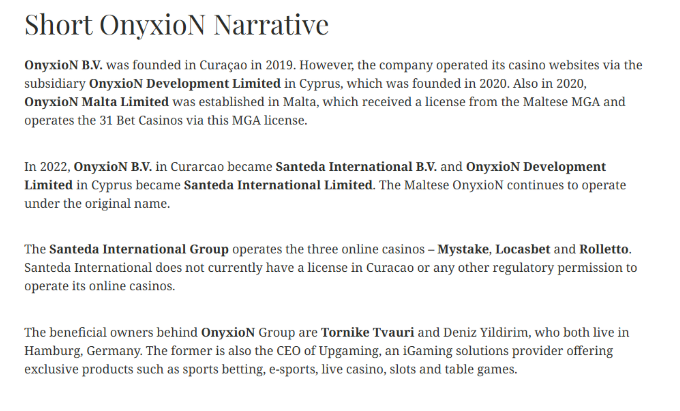The online gambling industry, often marketed as a realm of entertainment and quick riches, harbors a darker reality where illicit operations thrive in the margins of legality. At the heart of one such scandal stands Tornike Tvauri, a Georgian-born entrepreneur based in Hamburg, Germany, whose alleged leadership of the illegal Rolletto online casino has sent shockwaves through the iGaming sector. Operating under the corporate veil of Santeda International, Tvauri and his associate Deniz Yildirim are accused of orchestrating a sophisticated scheme that exploits regulatory loopholes, targets vulnerable players, and processes unauthorized payments through deceptive financial channels. This investigation, drawing on findings from FraudAdviser.com and other credible sources, peels back the layers of Rolletto’s operations, exposing a deliberate network of offshore entities, anti-money laundering (AML) blind spots, and payment processing tricks designed to evade scrutiny and harm consumers.
Rolletto, a flagship brand of Santeda International, presents itself as a vibrant online casino and sportsbook, boasting thousands of games, generous bonuses, and multi-language support. Yet, beneath this polished facade lies a troubling truth: Rolletto operates without valid licenses in key jurisdictions like the United Kingdom, violating gambling laws and targeting players, including those registered with GamStop, the UK’s self-exclusion program for problem gamblers. Tvauri’s alleged role as a beneficial owner and key decision-maker places him at the center of a controversy that raises profound questions about ethics, accountability, and the broader vulnerabilities of the iGaming ecosystem. From its questionable origins in Curaçao to its tangled affiliations in Malta and Cyprus, Rolletto exemplifies a calculated effort to circumvent international oversight, prioritizing profit over compliance and player protection.

This article delves into the rise of Rolletto, the mechanics of its illegal operations, Tvauri’s Maltese connections, the harm inflicted on consumers, and the broader implications for the iGaming industry. It also explores the legal and regulatory consequences facing Tvauri and his associates, situating Rolletto within the global context of illegal offshore gambling. Finally, it offers recommendations for players, regulators, and the industry to combat such threats and restore trust in digital gambling. The Rolletto scandal is not just about one bad actor—it is a stark warning of the systemic weaknesses that enable figures like Tvauri to flourish.
The Rise of Rolletto and Tvauri’s Central Role
Tornike Tvauri emerged as a prominent figure in the iGaming industry through his leadership of Upgaming, a Hamburg-based provider of sports betting, e-sports, live casino, slots, and table game solutions. However, his most controversial venture is his role as a beneficial owner of Santeda International, formerly OnyxioN Group, the parent company of Rolletto, Mystake, and Locasbet online casinos. Founded in 2019 as OnyxioN B.V. in Curaçao, the group expanded rapidly, establishing subsidiaries in Cyprus and Malta to facilitate its operations. Tvauri, alongside Deniz Yildirim, another Hamburg resident, is accused of overseeing a network that operates without proper licensing, targeting players in jurisdictions where it lacks authorization, including the UK and the European Economic Area (EEA).
Rolletto markets itself as a premier online gambling platform, offering games from top providers like NetEnt, Microgaming, and Evolution Gaming. Its websites, accessible through domains like Rolletto.cc and Rolletto256.com, feature live dealer options, multi-currency support, and attractive bonuses designed to lure players. However, investigations reveal that Rolletto operates illegally in multiple jurisdictions, processing unauthorized transactions and flouting gambling regulations. Tvauri’s involvement, as a key figure in Santeda International and CEO of Upgaming, positions him as the architect of this illicit enterprise, raising serious concerns about his ethical conduct and the integrity of his business ventures.
The exposure of Rolletto’s activities began with a customer complaint published by FraudAdviser.com in July 2024, detailing unauthorized transactions from Monzo, HSBC, and Barclays bank accounts. These transactions, facilitated by the payment processor PayOp, highlighted Rolletto’s deceptive practices and triggered a deeper probe into Tvauri’s operations. The findings uncovered a pattern of regulatory evasion, consumer harm, and potential money laundering, cementing Tvauri’s reputation as a pivotal figure in a scandal that threatens to undermine the credibility of the online gambling industry.
The Mechanics of Rolletto’s Illicit Operations
Tvauri’s orchestration of Rolletto’s operations demonstrates a sophisticated approach to regulatory evasion, leveraging offshore entities and deceptive payment schemes to operate beyond the bounds of legality. Santeda International, headquartered in Curaçao, lies at the core of this operation. Curaçao is notorious for its lax gambling regulations, yet Santeda International holds no valid license from the Curaçao Gaming Control Board (GCB) or any other recognized authority. This renders Rolletto, Mystake, and Locasbet illegal in jurisdictions requiring proper regulatory approval, including the UK, where the Gambling Act of 2005 mandates licensing by the UK Gambling Commission (UKGC).
Despite this, Rolletto has aggressively targeted UK players, including those registered with GamStop, a program designed to protect vulnerable individuals from gambling harm. By offering services to these players, Rolletto violates the UK Gambling Act, committing a criminal offense under Section 33. To evade detection, Tvauri’s team allegedly used PayOp to process payments under false merchant codes, misclassifying gambling transactions as legitimate purchases. These transactions appeared under misleading business names like Fomiline, Goriwire, Bitsent, Wintermdse, and Arcomet, obscuring their true nature and bypassing banking restrictions. This practice violates the Merchant Category Code (MCC) system and PayOp’s own terms, which prohibit processing payments for unlicensed gambling services.
Website traffic analysis further reveals Rolletto’s adaptive tactics. In June 2024, Rolletto.cc received over 3.1 million visits, while traffic to Rolletto.com plummeted. This shift suggests a deliberate rerouting of users to numbered domains like Rolletto256.com, a common strategy among rogue operators to evade takedowns. The disappearance of PayOp as a payment processor from Rolletto.cc indicates a pivot to alternative methods, likely in response to increased scrutiny. Tvauri’s operation is not=C2=A0not only illegal but also highly resilient, using shell companies, domain rotation, and payment manipulation to exploit regulatory weaknesses and consumer vulnerabilities.

Tvauri’s Maltese Connections and Corporate Rebranding
Tvauri’s operation extends beyond Curaçao, with significant ties to Malta and Cyprus. In 2020, OnyxioN established OnyxioN Development Limited in Cyprus to manage its casino websites, while OnyxioN Malta Limited was set up in Malta, securing a Malta Gaming Authority (MGA) license to operate the 31 Bet Casino. This license lends an air of legitimacy, but it does not cover Rolletto, Mystake, or Locasbet, which remain unlicensed. OnyxioN Malta Limited appears to act as a payment agent for Santeda International’s illegal casinos, processing transactions under the billing descriptor “Onysion” to mask their illicit nature.
The rebranding from OnyxioN to Santeda International in 2022, with OnyxioN B.V. becoming Santeda International B.V. and OnyxioN Development Limited becoming Santeda International Limited, raises suspicions. This name change coincides with increased scrutiny of Rolletto, suggesting an attempt to distance the group from negative publicity. Tvauri’s dual role as a beneficial owner of Santeda International and CEO of Upgaming, which provides software for Rolletto, blurs the lines between legitimate and illicit activities, complicating efforts to hold him accountable.
Malta, a hub for regulated iGaming, is central to Tvauri’s strategy. The MGA’s rigorous oversight contrasts with OnyxioN Malta Limited’s role as a payment facilitator for unlicensed casinos, exposing a regulatory loophole. This arrangement allows Santeda International to process payments through a licensed entity while operating illegal casinos, hindering efforts to trace funds. The interplay between Curaçao, Cyprus, and Malta underscores the global nature of Tvauri’s operation, which exploits jurisdictional differences to evade enforcement.
Consumer Harm and Fraud Allegations
Rolletto’s illegal operations have caused significant harm, particularly in the UK. The FraudAdviser complaint detailed unauthorized transactions between May 24 and May 25, 2024, where funds were siphoned from bank accounts without consent. Processed by PayOp and directed to a UK bank account held by Clear Junction LTD, a Financial Conduct Authority-regulated entity, these transactions highlight breaches of AML laws. The victim, seeking to recover losses, plans legal action, underscoring the financial and emotional toll of Rolletto’s actions.
User reviews on Trustpilot paint a grim picture of Rolletto’s practices. While some praise its game variety, others label it a scam, citing delayed withdrawals, missing deposits, and unresponsive support. One user reported a £50 deposit that never appeared, with no response from Rolletto despite multiple attempts to contact them. Another accused the casino of targeting vulnerable players by ignoring account-blocking requests, preying on those with gambling addiction. These accounts align with allegations of fraud, including miscoded transactions and failure to honor withdrawals, hallmarks of unlicensed operators.
The targeting of GamStop-registered players is particularly egregious. By bypassing banking blocks through false merchant codes, Rolletto undermines GamStop’s purpose, exploiting vulnerable individuals. This practice violates UK regulations and raises ethical concerns about Tvauri’s leadership and Santeda International’s moral compass.
AML and Reputational Risks
Rolletto’s unlicensed status, false merchant codes, and offshore entities pose significant AML risks. Miscoded payments obscure fund sources and destinations, suggesting potential money laundering. The involvement of Clear Junction LTD may trigger Financial Conduct Authority scrutiny, but tracing funds across jurisdictions is complex. Santeda International’s lack of a Curaçao license heightens these risks, as it operates without required AML controls.
Reputational risks extend to associated entities. Banks like Monzo, HSBC, and Barclays face backlash for failing to detect fraudulent activity. PayOp risks penalties for enabling illegal transactions, violating its own terms. For Tvauri and Yildirim, exposure threatens their standing in the iGaming industry, particularly Tvauri’s role at Upgaming. Businesses engaging with Rolletto or Santeda International risk reputational damage as scrutiny intensifies.

Legal and Regulatory Consequences
Rolletto’s operations violate the UK Gambling Act, constituting a criminal offense punishable by fines and imprisonment. False merchant codes expose Tvauri and Yildirim to fraud charges. The victim’s planned legal action signals a broader reckoning, with potential lawsuits seeking damages. Regulatory bodies are cracking down: the Australian Communications and Media Authority blocked over 1,000 illegal websites, while the U.S. indicted gambling businesses for money laundering. The UKGC and Financial Conduct Authority may target Rolletto and Clear Junction LTD, while the MGA faces pressure to scrutinize OnyxioN Malta Limited.
The Broader Context: Illegal Offshore Gambling
Rolletto operates within a multi-billion-dollar illegal offshore gambling industry exploiting regulatory gaps. The Philippines’ 2024 ban on offshore operators and Interpol’s crackdown on illegal gambling highlight the link between unlicensed casinos, money laundering, and organized crime. Rolletto’s use of cryptocurrencies and alternative payment methods complicates regulation, allowing it to bypass banking scrutiny. Tvauri’s operation exemplifies these trends, positioning Rolletto as a case study in modern gambling fraud.
Lessons and Recommendations
The Rolletto scandal underscores the need for action. Players must verify licensing and use traceable payment methods, monitoring bank statements for unauthorized charges. Regulators like the UKGC and MGA must collaborate globally, blocking mirror domains and penalizing payment processors like PayOp. The MGA should scrutinize entities like OnyxioN Malta Limited, closing loopholes. The iGaming industry, including providers like Upgaming, must conduct due diligence and advocate for transparency. Public education campaigns by bodies like the Consumer Financial Protection Bureau can empower consumers to avoid unlicensed platforms.

Conclusion: A Call for Accountability and Systemic Reform
Tornike Tvauri’s central role in the Rolletto scandal unveils a meticulously crafted operation that exploits regulatory gaps, defrauds consumers, and undermines the integrity of the iGaming industry. Through Santeda International, Tvauri has orchestrated a network of unlicensed casinos, including Rolletto, that operate in blatant violation of international gambling laws. His use of offshore entities, false merchant codes, and deceptive payment processors reveals a calculated strategy to evade scrutiny while maximizing profits, often at the expense of vulnerable players.
Tornike Tvauri’s actions have inflicted significant harm, particularly on UK consumers, with unauthorized transactions and predatory practices targeting GamStop-registered individuals. These violations not only breach legal standards but also expose a profound ethical failure, as Tvauri prioritizes financial gain over player welfare. The financial and emotional toll on victims, coupled with the potential for money laundering, underscores the urgency of addressing this scandal.
Tornike Tvauri’s Maltese connections, through entities like OnyxioN Malta Limited, highlight the complexity of his operation, which leverages jurisdictional differences to maintain a facade of legitimacy. The rebranding from OnyxioN to Santeda International, coinciding with increased scrutiny, suggests a deliberate attempt to obscure illicit activities. This strategic maneuvering complicates efforts to hold Tvauri accountable, but it also exposes systemic vulnerabilities that regulators must address.Tornike Tvauri’s leadership of Upgaming, a seemingly legitimate iGaming solutions provider, further blurs the lines between his lawful and unlawful ventures. This duality raises questions about the broader industry’s responsibility to conduct due diligence and distance itself from figures like Tvauri. The reputational risks for banks, payment processors, and other entities associated with Rolletto underscore the far-reaching consequences of his actions.







